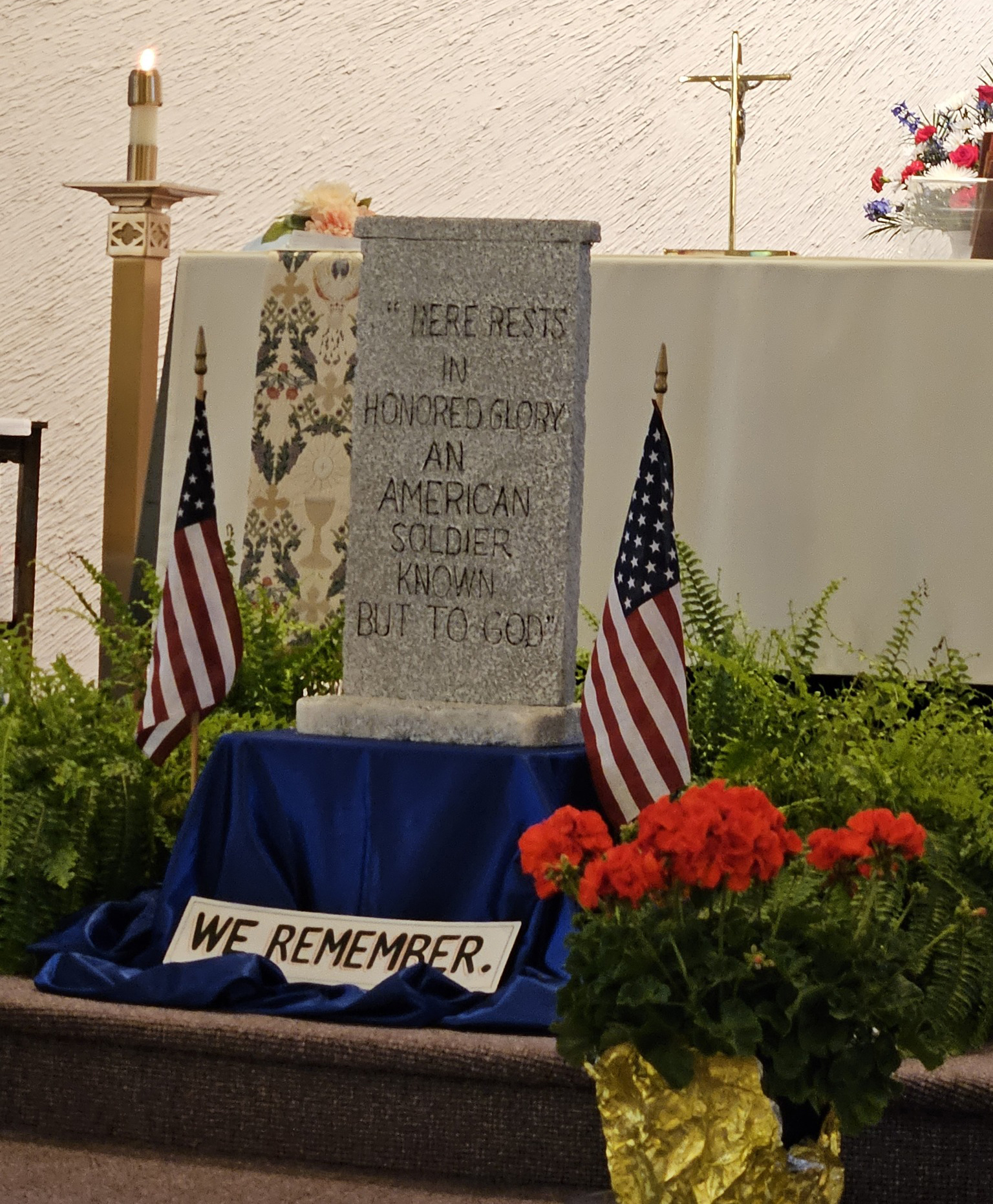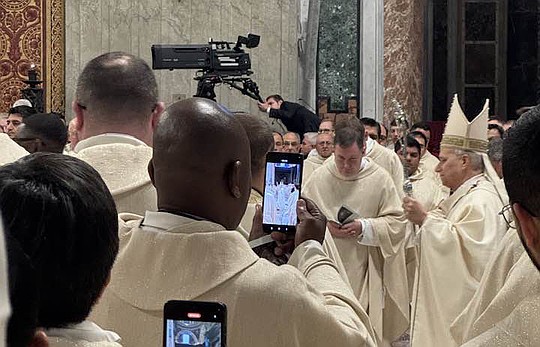Memorial Day: Pause to Remember
May 27, 2024 at 6:00 a.m.
 A memorial dedicated to all military personnel who lost their lives in service to their country sits at the base of the sanctuary in Corpus Christi Church, Willingboro. Many parishes throughout the Diocese will begin their observance of Memorial Day with the celebration of Mass. Bishop David M. O'Connell, C.M., reflects on the meaning of Memorial Day saying, " As Christians, however, we understand that there is a deeper meaning to the sacrifice made by our beloved dead men and women in uniform. ‘No one has greater love than this: to lay down one’s life for one’s friends’” (John 15:13).Mary Stadnyk photo
A memorial dedicated to all military personnel who lost their lives in service to their country sits at the base of the sanctuary in Corpus Christi Church, Willingboro. Many parishes throughout the Diocese will begin their observance of Memorial Day with the celebration of Mass. Bishop David M. O'Connell, C.M., reflects on the meaning of Memorial Day saying, " As Christians, however, we understand that there is a deeper meaning to the sacrifice made by our beloved dead men and women in uniform. ‘No one has greater love than this: to lay down one’s life for one’s friends’” (John 15:13).Mary Stadnyk photo Memorial Day is the national holiday that is widely regarded as the “unofficial beginning of summer.” Originally known as “Decoration Day,” the holiday dates back to a commemoration of U.S. military personnel who lost their lives in the Civil War.
First celebrated in numerous northern states on May 30 as early as 1866, “Decoration Day” became an annual national event to remember men and women who died in the service of their country during wartime by decorating their graves with flags and flowers. In 1971, Congress established “Memorial Day” as a federal holiday to be celebrated on the last Monday of May.
Traditions surrounding the national commemoration developed throughout the 20th century. Visits to cemeteries, speeches, displaying American flags, community parades and family picnics have become standard practice in cities and towns everywhere in the U.S.
Although not considered a “religious holiday,” Memorial Day is often solemnized as a time to reflect upon American patriots who made the ultimate sacrifice while protecting and defending the country they deeply loved. In a sense, it has become a “sacred” day fixed in the American psyche.
The “secular ways” that we remember all those who have died for our country on Memorial Day are, indeed, good things that draw us together as a nation. As Christians, however, we understand that there is a deeper meaning to the sacrifice made by our beloved dead men and women in uniform. “No one has greater love than this: to lay down one’s life for one’s friends” (John 15:13).
Memorial Day is a sacred occasion to remember that sacrifice, that love. Memorial Day is a sacred occasion to be grateful to God for those who made the ultimate sacrifice in wars throughout our national history so that we might continue to enjoy the freedoms that are ours. And in the midst of our holiday celebrations, Memorial Day is a sacred occasion that calls us to pray for them, for their eternal peace and for peace in our world.
Related Stories
Wednesday, January 07, 2026
E-Editions
Events
 A memorial dedicated to all military personnel who lost their lives in service to their country sits at the base of the sanctuary in Corpus Christi Church, Willingboro. Many parishes throughout the Diocese will begin their observance of Memorial Day with the celebration of Mass. Bishop David M. O'Connell, C.M., reflects on the meaning of Memorial Day saying, " As Christians, however, we understand that there is a deeper meaning to the sacrifice made by our beloved dead men and women in uniform. ‘No one has greater love than this: to lay down one’s life for one’s friends’” (John 15:13).Mary Stadnyk photo
A memorial dedicated to all military personnel who lost their lives in service to their country sits at the base of the sanctuary in Corpus Christi Church, Willingboro. Many parishes throughout the Diocese will begin their observance of Memorial Day with the celebration of Mass. Bishop David M. O'Connell, C.M., reflects on the meaning of Memorial Day saying, " As Christians, however, we understand that there is a deeper meaning to the sacrifice made by our beloved dead men and women in uniform. ‘No one has greater love than this: to lay down one’s life for one’s friends’” (John 15:13).Mary Stadnyk photo Memorial Day is the national holiday that is widely regarded as the “unofficial beginning of summer.” Originally known as “Decoration Day,” the holiday dates back to a commemoration of U.S. military personnel who lost their lives in the Civil War.
First celebrated in numerous northern states on May 30 as early as 1866, “Decoration Day” became an annual national event to remember men and women who died in the service of their country during wartime by decorating their graves with flags and flowers. In 1971, Congress established “Memorial Day” as a federal holiday to be celebrated on the last Monday of May.
Traditions surrounding the national commemoration developed throughout the 20th century. Visits to cemeteries, speeches, displaying American flags, community parades and family picnics have become standard practice in cities and towns everywhere in the U.S.
Although not considered a “religious holiday,” Memorial Day is often solemnized as a time to reflect upon American patriots who made the ultimate sacrifice while protecting and defending the country they deeply loved. In a sense, it has become a “sacred” day fixed in the American psyche.
The “secular ways” that we remember all those who have died for our country on Memorial Day are, indeed, good things that draw us together as a nation. As Christians, however, we understand that there is a deeper meaning to the sacrifice made by our beloved dead men and women in uniform. “No one has greater love than this: to lay down one’s life for one’s friends” (John 15:13).
Memorial Day is a sacred occasion to remember that sacrifice, that love. Memorial Day is a sacred occasion to be grateful to God for those who made the ultimate sacrifice in wars throughout our national history so that we might continue to enjoy the freedoms that are ours. And in the midst of our holiday celebrations, Memorial Day is a sacred occasion that calls us to pray for them, for their eternal peace and for peace in our world.










